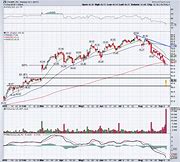The recent performance of cybersecurity firm Zscaler has sparked excitement among investors, with its stock surging by 10% following strong results driven by the growth in Artificial Intelligence (AI) technologies. According to the report,
“echoes the strength we noted in our preview, and begins to prove out the reacceleration story that the company has been pointing to over the past few quarters,”
as noted by Morgan Stanley’s Keith Weiss.
In their financial report, Zscaler disclosed a net loss of $4.1 million, translating to a loss of 3 cents per share for the quarter under review. This figure stands in contrast to last year’s net income of $19.1 million or 12 cents per share. Despite this apparent setback, the company remains optimistic about its future prospects and issued a bullish adjusted earnings per share (EPS) guidance for the fiscal fourth quarter.
Zscaler anticipates that its adjusted earnings will fall within a range of 79 cents to 80 cents per share, exceeding market expectations set at 77 cents by LSEG. Furthermore, demonstrating strategic foresight, Zscaler also announced the appointment of Kevin Rubin as its new chief financial officer – a move that signifies commitment towards driving continued growth and operational excellence.
Amidst these developments, industry experts have weighed in on Zscaler’s trajectory and potential impact on the market landscape. The appointment of Kevin Rubin was viewed positively as an addition that could bolster financial stewardship within the organization. In light of emerging cybersecurity challenges such as state-sponsored hacking activities, Jay Chaudhry – CEO of Zscaler – provided insights on pressing issues like Chinese hacking attempts targeting sensitive entities like the U.S. Treasury.
As Zscaler continues to navigate through dynamic market conditions and technological advancements, its strategic decisions regarding leadership appointments and financial performance will likely play a crucial role in shaping its competitive positioning and long-term sustainability within the cybersecurity sector.









Leave feedback about this